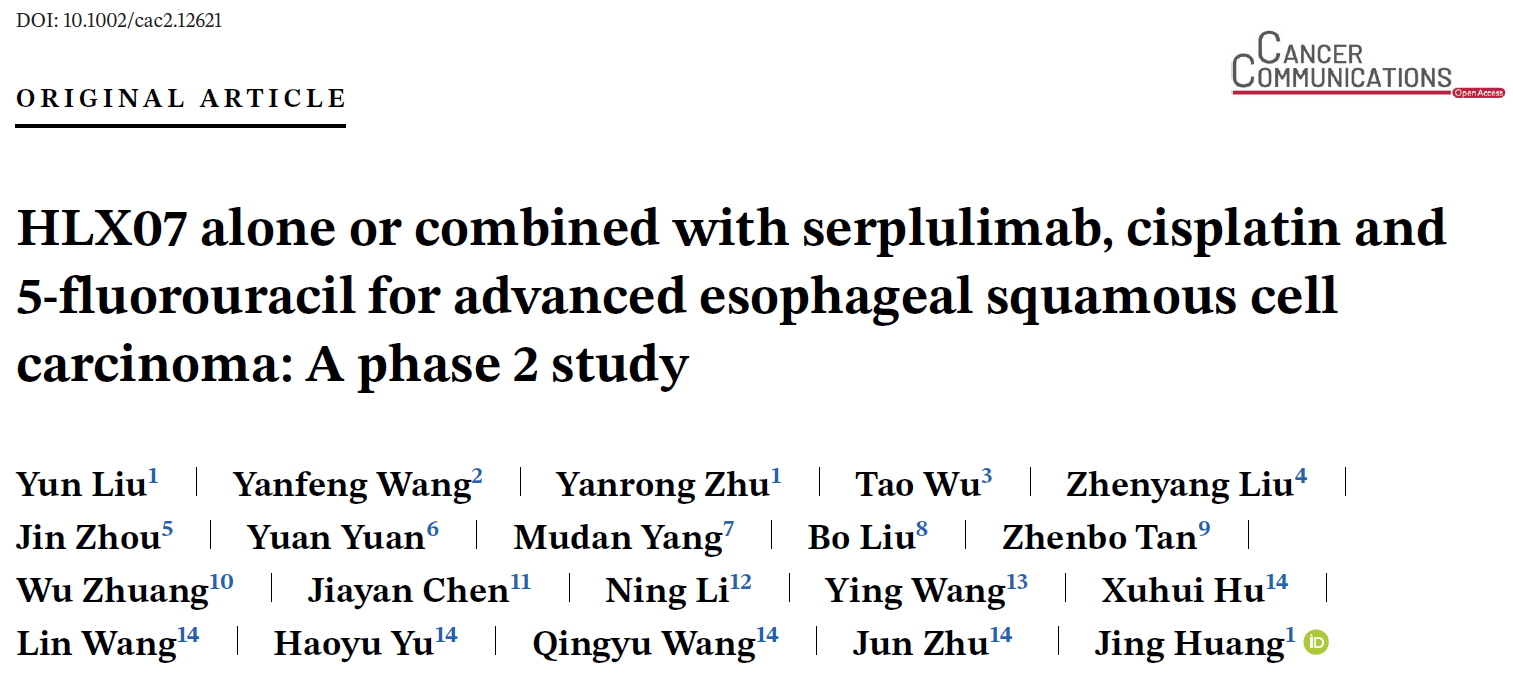Recently, the results from the phase 2 study (HLX07-ESCC201) of HLX07, the company’s innovative humanised anti-epidermal growth factor receptor (EGFR) monoclonal antibody, in patients with locally advanced, unresectable, or metastatic esophageal squamous cell carcinoma (ESCC) were published in Cancer Communications (2023 impact factor: 20.1). The study was led by Professor Jing Huang from the National Cancer Center/National Clinical Research Center for Cancer/Cancer Hospital, Chinese Academy of Medical Sciences and Peking Union Medical College.

Esophageal cancer is one of the most common malignancies worldwide, and can be mainly classified as squamous cell carcinoma and adenocarcinoma, with ESCC accounting for more than 84% of esophageal cancer. [1] Esophageal cancer is highly prevalent in China; according to the estimates of cancer incidence and mortality in China in 2016, there were 252,500 new cases and 193,900 deaths related to esophageal cancer, ranking sixth and fifth in all malignant tumours in China, respectively. [2] As the symptoms of early esophageal cancer are often subtle, most patients are often diagnosed at mid- to late-stage, therefore missing out on surgical treatment. The main treatment for advanced patients is systemic treatment with chemotherapy or targeted therapy, but with limited efficacy, high recurrence and metastatic rate. Therefore, the development of new drugs and treatments are urgently needed. In recent years, immuno-oncology therapy has become one of the research priorities globally. Many studies have shown that anti-PD-1 mAb combined with chemotherapy can bring about survival benefits to patients with esophageal cancer. Immune checkpoint inhibitor, such as serplulimab, combined with chemotherapy has become the standard first-line treatment for advanced esophageal cancer in China.[3] However, there is still a need to explore more diverse treatment to benefit a broader range of patients. To date, no approval has been granted for the use of EGFR targeted drugs in advanced ESCC.
The results of the HLX07-ESCC201 study were first released in June 2023 at the 2023 American Society of Clinical Oncology (ASCO) Annual Meeting.[4] In this open-label, multicentre phase 2 study, patients aged 18–75 years with histologically or cytologically confirmed locally advanced, unresectable/metastatic esophageal squamous cell carcinoma or esophageal adenosquamous carcinoma were enrolled. Patients with no prior systemic antitumour therapy were assigned to group A and given HLX07 1000 mg (anti-EGFR monoclonal antibody) plus serplulimab 200 mg (anti-PD-1 monoclonal antibody) and chemotherapy (5-FU 2400 mg/m2 + cisplatin 50 mg/m2), Q2W IV. Patients who had failed first-line immuno-chemotherapy combination or at least two lines of other systemic antitumor therapy were assigned to group B and given HLX07 monotherapy (1000 mg Q2W IV). The primary endpoints were objective response rate (ORR) and progression-free survival (PFS) assessed by an independent radiological review committee and investigators per RECIST v1.1.
The data cut-off date for this publication in Cancer Communications is July 4, 2023. A total of 50 patients were enrolled in Group A (n = 30) and Group B (n = 20). The ORRs assessed by IRRC were 60% (95% CI 40.6–77.3%) and 15.0% (95% CI 3.2–37.9%) in the respective groups. The median PFSs were 7.8 months (95% CI 3.3–9.1) and 1.5 months (95% CI 1.3–3.7), respectively. IRRC-assessed median duration of response (DOR) was not reached in group B (>6 months) and 7.2 months (95% CI 4.4–not evaluable) in group A. The findings indicate that HLX07 monotherapy and its combination with serplulimab and chemotherapy showed manageable toxicity and promising antitumor activity in patients with recurrent or metastatic ESCC. Randomised controlled trials are warranted to further establish the safety and efficacy of HLX07 against ESCC.[5]
HLX07 is an innovative drug targeting EGFR independently developed by Henlius. Adopting the self-developed advanced antibody engineering platform, Henlius re-engineered cetuximab by humanising its Fab regions and minimizing its glycan contents to generate HLX07 to reduce immunogenicity and maintain a high binding affinity of the product. To date, Henlius holds patents of HLX07 in several jurisdictions including China, the United States, the European Union, Australia, and Japan. Currently, Henlius is conducting phase 2 clinical trials to explore HLX07 as monotherapy or in combination with HANSIZHUANG (serplulimab) for the treatment of solid tumours including ESCC, cutaneous squamous cell carcinoma (CSCC), and nasopharyngeal carcinoma (NPC).
Looking forward, Henlius will actively improve efficiency through innovations, focusing on unmet medical needs to bring more high-quality and affordable therapies to patients worldwide.
【Reference】
[1] Arnold, M., Ferlay, J., van Berge Henegouwen, M.I. & Soerjomataram, I. Global burden of oesophageal and gastric cancer by histology and subsite in 2018. Gut 69, 1564-1571 (2020).
[2] Zheng, R., Zhang, S., Zeng, H., et al. Cancer incidence and mortality in China, 2016. Journal of the National Cancer Center 2, 1-9 (2022).
[3] 食管癌诊疗指南(2022年版). 中国国家卫生健康委员会.
[4] Huang J, Liu Y, Wu T, et al. A phase 2 study of HLX07 as monotherapy or combination therapy in patients with locally advanced, unresectable, or metastatic esophageal squamous cell carcinoma. Journal of Clinical Oncology. Volume 41, Number 16_suppl
[5] Liu Y, Wang Y, Zhu Y, et al. HLX07 alone or combined with serplulimab, cisplatin and 5-fluorouracil for advanced esophageal squamous cell carcinoma: A phase 2 study. Cancer Commun (Lond). Published online October 24, 2024. doi:10.1002/cac2.12621
